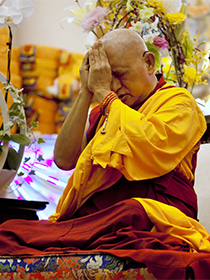- Home
- FPMT Homepage
Foundation for the Preservation of the Mahayana Tradition
The FPMT is an organization devoted to preserving and spreading Mahayana Buddhism worldwide by creating opportunities to listen, reflect, meditate, practice and actualize the unmistaken teachings of the Buddha and based on that experience spreading the Dharma to sentient beings. We provide integrated education through which people’s minds and hearts can be transformed into their highest potential for the benefit of others, inspired by an attitude of universal responsibility and service. We are committed to creating harmonious environments and helping all beings develop their full potential of infinite wisdom and compassion. Our organization is based on the Buddhist tradition of Lama Tsongkhapa of Tibet as taught to us by our founders Lama Thubten Yeshe and Lama Thubten Zopa Rinpoche.
- Willkommen
Die Stiftung zur Erhaltung der Mahayana Tradition (FPMT) ist eine Organisation, die sich weltweit für die Erhaltung und Verbreitung des Mahayana-Buddhismus einsetzt, indem sie Möglichkeiten schafft, den makellosen Lehren des Buddha zuzuhören, über sie zur reflektieren und zu meditieren und auf der Grundlage dieser Erfahrung das Dharma unter den Lebewesen zu verbreiten.
Wir bieten integrierte Schulungswege an, durch denen der Geist und das Herz der Menschen in ihr höchstes Potential verwandelt werden zum Wohl der anderen – inspiriert durch eine Haltung der universellen Verantwortung und dem Wunsch zu dienen. Wir haben uns verpflichtet, harmonische Umgebungen zu schaffen und allen Wesen zu helfen, ihr volles Potenzial unendlicher Weisheit und grenzenlosen Mitgefühls zu verwirklichen.
Unsere Organisation basiert auf der buddhistischen Tradition von Lama Tsongkhapa von Tibet, so wie sie uns von unseren Gründern Lama Thubten Yeshe und Lama Thubten Zopa Rinpoche gelehrt wird.
- Bienvenidos
La Fundación para la preservación de la tradición Mahayana (FPMT) es una organización que se dedica a preservar y difundir el budismo Mahayana en todo el mundo, creando oportunidades para escuchar, reflexionar, meditar, practicar y actualizar las enseñanzas inconfundibles de Buda y en base a esa experiencia difundir el Dharma a los seres.
Proporcionamos una educación integrada a través de la cual las mentes y los corazones de las personas se pueden transformar en su mayor potencial para el beneficio de los demás, inspirados por una actitud de responsabilidad y servicio universales. Estamos comprometidos a crear ambientes armoniosos y ayudar a todos los seres a desarrollar todo su potencial de infinita sabiduría y compasión.
Nuestra organización se basa en la tradición budista de Lama Tsongkhapa del Tíbet como nos lo enseñaron nuestros fundadores Lama Thubten Yeshe y Lama Zopa Rinpoche.
A continuación puede ver una lista de los centros y sus páginas web en su lengua preferida.
- Bienvenue
L’organisation de la FPMT a pour vocation la préservation et la diffusion du bouddhisme du mahayana dans le monde entier. Elle offre l’opportunité d’écouter, de réfléchir, de méditer, de pratiquer et de réaliser les enseignements excellents du Bouddha, pour ensuite transmettre le Dharma à tous les êtres. Nous proposons une formation intégrée grâce à laquelle le cœur et l’esprit de chacun peuvent accomplir leur potentiel le plus élevé pour le bien d’autrui, inspirés par le sens du service et une responsabilité universelle. Nous nous engageons à créer un environnement harmonieux et à aider tous les êtres à épanouir leur potentiel illimité de compassion et de sagesse. Notre organisation s’appuie sur la tradition guéloukpa de Lama Tsongkhapa du Tibet, telle qu’elle a été enseignée par nos fondateurs Lama Thoubtèn Yéshé et Lama Zopa Rinpoché.
Visitez le site de notre Editions Mahayana pour les traductions, conseils et nouvelles du Bureau international en français.
Voici une liste de centres et de leurs sites dans votre langue préférée
- Benvenuto
L’FPMT è un organizzazione il cui scopo è preservare e diffondere il Buddhismo Mahayana nel mondo, creando occasioni di ascolto, riflessione, meditazione e pratica dei perfetti insegnamenti del Buddha, al fine di attualizzare e diffondere il Dharma fra tutti gli esseri senzienti.
Offriamo un’educazione integrata, che può trasformare la mente e i cuori delle persone nel loro massimo potenziale, per il beneficio di tutti gli esseri, ispirati da un’attitudine di responsabilità universale e di servizio.
Il nostro obiettivo è quello di creare contesti armoniosi e aiutare tutti gli esseri a sviluppare in modo completo le proprie potenzialità di infinita saggezza e compassione.
La nostra organizzazione si basa sulla tradizione buddhista di Lama Tsongkhapa del Tibet, così come ci è stata insegnata dai nostri fondatori Lama Thubten Yeshe e Lama Zopa Rinpoche.
Di seguito potete trovare un elenco dei centri e dei loro siti nella lingua da voi prescelta.
- 欢迎 / 歡迎
简体中文
“护持大乘法脉基金会”( 英文简称:FPMT。全名:Foundation for the Preservation of the Mahayana Tradition) 是一个致力于护持和弘扬大乘佛法的国际佛教组织。我们提供听闻,思维,禅修,修行和实证佛陀无误教法的机会,以便让一切众生都能够享受佛法的指引和滋润。
我们全力创造和谐融洽的环境, 为人们提供解行并重的完整佛法教育,以便启发内在的环宇悲心及责任心,并开发内心所蕴藏的巨大潜能 — 无限的智慧与悲心 — 以便利益和服务一切有情。
FPMT的创办人是图腾耶喜喇嘛和喇嘛梭巴仁波切。我们所修习的是由两位上师所教导的,西藏喀巴大师的佛法传承。
繁體中文
護持大乘法脈基金會”( 英文簡稱:FPMT。全名:Found
ation for the Preservation of the Mahayana Tradition ) 是一個致力於護持和弘揚大乘佛法的國際佛教組織。我們提供聽聞, 思維,禪修,修行和實證佛陀無誤教法的機會,以便讓一切眾生都能 夠享受佛法的指引和滋潤。 我們全力創造和諧融洽的環境,
為人們提供解行並重的完整佛法教育,以便啟發內在的環宇悲心及責 任心,並開發內心所蘊藏的巨大潛能 — 無限的智慧與悲心 – – 以便利益和服務一切有情。 FPMT的創辦人是圖騰耶喜喇嘛和喇嘛梭巴仁波切。
我們所修習的是由兩位上師所教導的,西藏喀巴大師的佛法傳承。 察看道场信息:
- FPMT Homepage
- News/Media
-
- Study & Practice
-
-
- About FPMT Education Services
- Latest News
- Programs
- New to Buddhism?
- Buddhist Mind Science: Activating Your Potential
- Heart Advice for Death and Dying
- Discovering Buddhism
- Living in the Path
- Exploring Buddhism
- FPMT Basic Program
- FPMT Masters Program
- FPMT In-Depth Meditation Training
- Maitripa College
- Lotsawa Rinchen Zangpo Translator Program
- Universal Education for Compassion & Wisdom
- Online Learning Center
-
- Prayers & Practice Materials
- Overview of Prayers & Practices
- Full Catalogue of Prayers & Practice Materials
- Explore Popular Topics
- Benefiting Animals
- Chenrezig Resources
- Death & Dying Resources
- Lama Chopa (Guru Puja)
- Lama Zopa Rinpoche: Compendium of Precious Instructions
- Lama Zopa Rinpoche: Life Practice Advice
- Lama Zopa Rinpoche Practice Series
- Lamrim Resources
- Mantras
- Prayer Book Updates
- Purification Practices
- Sutras
- Thought Transformation (Lojong)
- Audio Materials
- Dharma Dates - Tibetan Calendar
- Translation Services
- Publishing Services
- Ways to Offer Support
- Prayers & Practice Materials
-
- Teachings and Advice
- Find Teachings and Advice
- Lama Zopa Rinpoche Advice Page
- Lama Zopa Rinpoche: Compendium of Precious Instructions
- Lama Zopa Rinpoche Video Teachings
- ༧སྐྱབས་རྗེ་བཟོད་པ་རིན་པོ་ཆེ་མཆོག་ནས་སྩལ་བའི་བཀའ་སློབ་བརྙན་འཕྲིན།
- Podcasts
- Lama Yeshe Wisdom Archive
- Buddhism FAQ
- Dharma for Young People
- Resources on Holy Objects
- Teachings and Advice
-
-
*If a menu item has a submenu clicking once will expand the menu clicking twice will open the page.
-
-
- Centers
-
- Teachers
-
- Projects
-
-
-
-
*If a menu item has a submenu clicking once will expand the menu clicking twice will open the page.
-
-
- FPMT
-
- Shop
-
-
-
The Foundation Store is FPMT’s online shop and features a vast selection of Buddhist study and practice materials written or recommended by our lineage gurus. These items include homestudy programs, prayers and practices in PDF or eBook format, materials for children, and other resources to support practitioners.
Items displayed in the shop are made available for Dharma practice and educational purposes, and never for the purpose of profiting from their sale. Please read FPMT Foundation Store Policy Regarding Dharma Items for more information.
-
-
20
Lama Zopa Rinpoche’s Losar: A Report from Bodhgaya
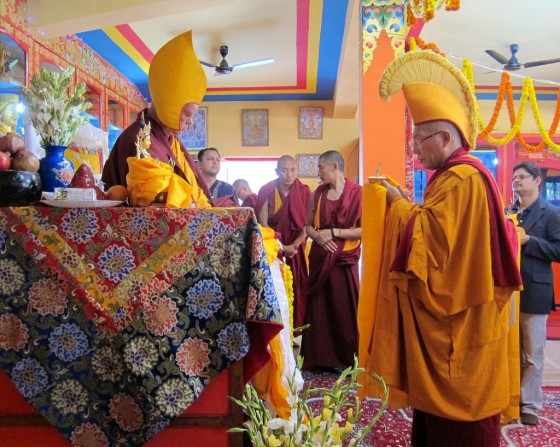
Lama Zopa Rinpoche and Dagri Rinpoche during long life puja on Losar, Root Institute, Bodhgaya, India, March 2014. Photo by Ven. Sarah Thresher.
By Ven. Sarah Thresher
Lama Zopa Rinpoche has been staying at Root Institute in Bodhgaya, India. Rinpoche has been engaged in many practices during Losar and the two weeks that follow. Ven. Sarah Thresher has been participating in these virtuous activities and shared this report.
Losar started very early morning with Yamantaka and Palden Lhamo prayers before dawn. Dagri Rinpoche stayed over at Root Institute to join Rinpoche for the prayers. Before dawn the monks served early morning Tibetan tea and kapse [fried bread].
After breakfast people began arriving for the long life puja for Lama Zopa Rinpoche requested by Dagri Rinpoche and Root Institute. Representatives from various Indian centers and the two Maitreya Projects – in Bodhgaya and Kushinagar – led Rinpoche into the gompa. Rinpoche went first to offer body, speech and mind to the decorated throne of His Holiness the Dalai Lama and then the throne of Lama Yeshe. This Losar was the 30th anniversary of Lama Yeshe’s passing away.
Dagri Rinpoche and Keutsang Rinpoche both took part in the puja along with several rows of monks from Sera Je Monastery. Even though Bodhgaya is not busy now, the gompa was full with people showing up from all over to pray for the guru’s long life. Following the tsog offering, Rinpoche took the microphone and began teaching. First he explained how important are these 15 days of Losar – the days that commemorate Buddha displaying miracles to subdue the Tirthika teachers – because at this time merit multiplies many 100 millions of times. Rinpoche commented that for “lazy” people like himself, it was an opportunity to make up for all the lost time of the rest of the year when no practice was done.
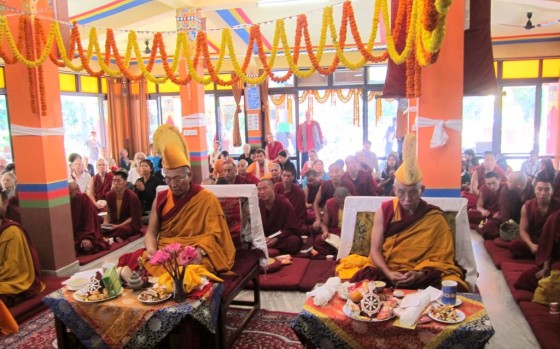
Dagri Rinpoche and Keutsang Rinpoche at Root Institute, Bodhgaya, India, March 2014. Photo by Ven. Sarah Thresher.
Rinpoche then continued with a beautiful talk about the qualities of Lama Yeshe and the importance of the guru. He quoted Padampa Sangye who advised, “Cherish the Guru more than the Buddha and realizations will come in this lifetime.” Rinpoche described some of the obvious qualities of Lama Yeshe – his always-loving aspect that attracted everyone to him, his humility, his wisdom – and explained that Lama was known by all to be a great scholar. Rinpoche then mentioned that Lama Yeshe was also a great yogi who had the tantric realizations of clear light and illusory body but that he hid these profound practices by meditating while lying down during his regular afternoon “nap.” Rinpoche said that whatever benefit the FPMT had been able to offer and however much we ourselves had been able to learn and practice, it was all due to Lama Yeshe’s kindness because it was Lama who set up the organization.
Then Rinpoche praised the director of Root Institute, Ven. Trisha, for her devotion to Buddha, Dharma, Sangha and compassion, which meant the center was harmonious and able to benefit sentient beings greatly.
Following the puja, lunch was offered on the lawn and the three lamas sat outside for a long leisurely lunch discussing Dharma.
In the afternoon, Rinpoche went to the Mahabodhi Stupa around 4 p.m. and stayed until 9 p.m.! This was the first day of the 15 days of thousands of light offerings made at the stupa by Root Institute, so Rinpoche first blessed and offered the lights. He then taught on motivation and how to circumambulate and led the group around the stupa before going to offer robes and bowls of fruit and flowers to the main Buddha statue along with Dagri Rinpoche and Keutsang Rinpoche. After making offerings and prayers in the main shrine, the three lamas sat under the Bodhi Tree, where they recited many more prayers and took the bodhisattva vows.
Rinpoche continued circumambulating while reading 40 pages of Lama Tsongkhapa’s Interpretable and Definitive Meaning (Lekshay Nyingpo) until the battery ran out on the flashlight. Along the way more and more people joined the circumambulation and Rinpoche would give spontaneous teachings. He pointed out one place where he used to sit and recite many prayers in the past. He also taught a young Tibetan girl who was prostrating around the stupa by doing short prostrations on the benefits of the full-length prostration.
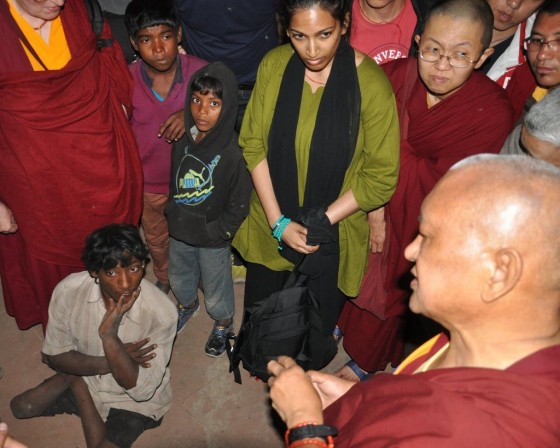
Lama Zopa Rinpoche teaching beggar, Bodhgaya, India, March 2014. Photo by Ven. Sarah Thresher.
As we were leaving the stupa, a beggar who had polio and could not walk came up to Rinpoche. Rinpoche asked him some questions and then began giving a long teaching (translated into Hindi by one of the students). He told the story about a boy in Nepal who had no arms but had managed to overcome his disability and graduate from Delhi University. Then Rinpoche taught the very essence of Dharma: how it is the mind that creates our sufferings and problems and the mind that creates happiness, therefore it is so important to transform the mind. And how positive actions bring happiness and harmful actions bring suffering. A crowd of Indians and beggars gathered around listening to Rinpoche’s skillful teaching. I have never seen any other lama teach the beggars in Bodhgaya before and this young man was obviously amazed by all the attention he was receiving.
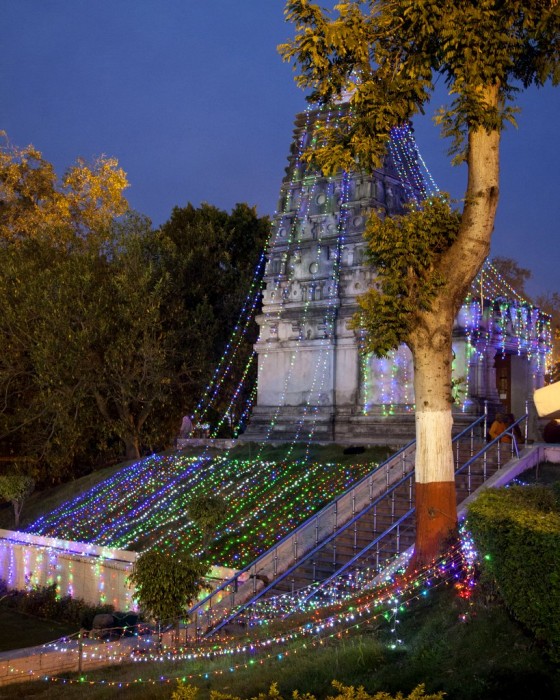
Light offerings at Mahabodhi Stupa, part of Root Institute’s Festival of Light and Merit, Bodhgaya, India, March 2014. Photo by Andy Melnic.
Read more from Ven. Sarah Thresher on Rinpoche’s activites during Monlam.
Learn more about Lama Zopa Rinpoche, spiritual director of the Foundation for the Preservation of Mahayana Tradition (FPMT), and Rinpoche’s vision for a better world. Sign up to receive news and updates.
- Tagged: losar, mahabodhi stupa, mandala, ven. sarah thresher
- 0
- Home
- News/Media
- Study & Practice
- About FPMT Education Services
- Latest News
- Programs
- New to Buddhism?
- Buddhist Mind Science: Activating Your Potential
- Heart Advice for Death and Dying
- Discovering Buddhism
- Living in the Path
- Exploring Buddhism
- FPMT Basic Program
- FPMT Masters Program
- FPMT In-Depth Meditation Training
- Maitripa College
- Lotsawa Rinchen Zangpo Translator Program
- Universal Education for Compassion & Wisdom
- Online Learning Center
- Prayers & Practice Materials
- Overview of Prayers & Practices
- Full Catalogue of Prayers & Practice Materials
- Explore Popular Topics
- Benefiting Animals
- Chenrezig Resources
- Death & Dying Resources
- Lama Chopa (Guru Puja)
- Lama Zopa Rinpoche: Compendium of Precious Instructions
- Lama Zopa Rinpoche: Life Practice Advice
- Lama Zopa Rinpoche Practice Series
- Lamrim Resources
- Mantras
- Prayer Book Updates
- Purification Practices
- Sutras
- Thought Transformation (Lojong)
- Audio Materials
- Dharma Dates – Tibetan Calendar
- Translation Services
- Publishing Services
- Teachings and Advice
- Find Teachings and Advice
- Lama Zopa Rinpoche Advice Page
- Lama Zopa Rinpoche: Compendium of Precious Instructions
- Lama Zopa Rinpoche Video Teachings
- ༧སྐྱབས་རྗེ་བཟོད་པ་རིན་པོ་ཆེ་མཆོག་ནས་སྩལ་བའི་བཀའ་སློབ་བརྙན་འཕྲིན།
- Podcasts
- Lama Yeshe Wisdom Archive
- Buddhism FAQ
- Dharma for Young People
- Resources on Holy Objects
- Ways to Offer Support
- Centers
- Teachers
- Projects
- Charitable Projects
- Make a Donation
- Applying for Grants
- News about Projects
- Other Projects within FPMT
- Support International Office
- Projects Photo Galleries
- Give Where Most Needed
- FPMT
- Shop
Subscribe to FPMT News
Translate*
*powered by Google TranslateTranslation of pages on fpmt.org is performed by Google Translate, a third party service which FPMT has no control over. The service provides automated computer translations that are only an approximation of the websites' original content. The translations should not be considered exact and only used as a rough guide.I want to say without hesitation that the purpose of our life is happiness.







